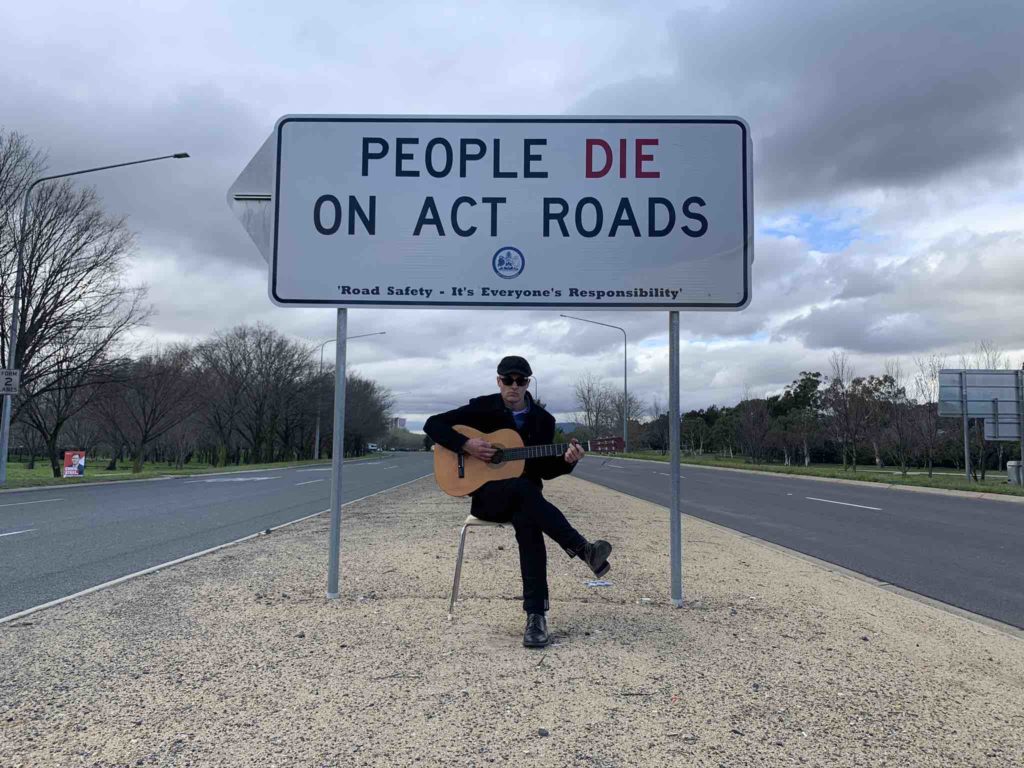John Sharkey III – Shoot Out The Cameras
By Sophie in News | 0 comments

Mistletone is proud to release the debut solo album by Philly-born, Canberra-dwelling John Sharkey III. Shoot Out The Cameras is out March 5 on Mistletone (AU/NZ) and 12XU (USA); pre-order vinyl here. The arresting first single, “I Found Everyone This Way”, can be heard below.
Written and recorded amidst the devastating bushfires which ravaged his adopted hometown Canberra, just before the wave of pandemic broke, Shoot Out The Cameras reveals John Sharkey III to be a master craftsman; honing in on the existential dread of living in a burning world, and the imperative to find beauty in what remains.
Perhaps best known as the creative force behind confrontational noise-punk band Clockcleaner, which erupted from the fertile soil of Philly’s DIY scene in the 00s, Sharkey’s solid underground creds include hardcore/punk bands such as 9 Shocks Terror and more recently, literate indie-rock explorations as Puerto Rico Flowers and Dark Blue.
It was love (of course) that brought Sharkey from Philly to Melbourne in 2008, where he worked behind the bar at beloved venue, The Tote. Sharkey and his partner Yasmin moved back to Philly for several years; then, amid the darkening landscape of US politics, the couple decided to settle in Canberra, Yasmin’s hometown. A lunatic sports fan, Sharkey adopted the Canberra Raiders with the same fervour as his beloved Philly Eagles, and has connected with hardcore Rugby League fans, making several guest appearances on the wildly popular NRL Boom Rookies podcast.
At a physical but not psychological remove from the horrifying dysfunction of Trump’s America, Sharkey watched catastrophic bushfires encircle Canberra, raging through the hills of the Southern Tablelands, the city glowing orange, the suburbs suffocating in smoke. This is when the songs of Shoot Out The Cameras took form.
As if to echo the craters of “before” and “after” that apocalyptic events leave in our collective consciousness, the songs arranged themselves into a cinematic narrative arc, from the foreboding of disaster (Side A) through its aftermath (Side B). The background horrors of totalitarianism, paranoia and surveillance also stalk the album – the cameras of the title inspired by Canberra’s omnipresent CCTV and speed cameras – just to add to the unmistakable sense of impending doom.

Such heavy subject matter brought into his music, for the first time, a treasure that Sharkey had carried within him since his teens; the mighty influence of one of Americana’s great auteurs, Iris Dement. Dement’s ability to cut to the bone, in her sweet and devastating songs, deeply informed Sharkey’s songwriting on Shoot Out The Cameras.
“My grandmother raised me on country music – Ray Price and Patsy Cline”, Sharkey recalls. “When I was 12, my mother would flog Iris Dement’s first two albums on drives to the beach. I was into Black Flag, but come 16 or 17, I was sneaking into the car to steal her tapes. Iris Dement crept into my psyche, and never left. She taught me not to hold back, when it comes to death or sorrow, doubling down on depressive lyrics.”
Fate intervened in the shaggy shape of Philly hero Kurt Vile, who invited Sharkey onstage when he toured Canberra last year. In the audience that night was Canberra native Nick Craft, who stood mouth agape as Sharkey sang pristine country harmonies with Vile on a cover of The Highwaymen’s “Silver Stallion”. Once Craft heard Sharkey’s demos, he urged him to make an album.
Holed up in a small studio on Queanbeyan’s industrial estate, Sharkey and Craft captured Shoot Out The Cameras in two marathon sessions. Beautifully recorded, the starkness of Sharkey’s lyrical imagery and pit-of-the-stomach emotions are honoured with nothing more than guitar and voice, and, on the album’s closer, the glisten of Philly homie Mary Lattimore’s harp.
The result is an album of searing emotional depth, which faces the onslaught of disaster unflinchingly, with the hope and determination that families and communities must muster to pull through the personal and collective nightmares we all face. Sharkey remains a staunch optimist, his love for his adopted Australia only strengthened by watching it burn.
“We will adapt, we will get through this together,” he vows. “The most important thing to have in your arsenal of emotions is empathy. Not many people have it; so you have to build your own resilience and strength to deal with that too. You have to be tougher than anything the world can throw at you.”
email this | tag this | digg this | trackback | comment RSS feed
Post a Comment